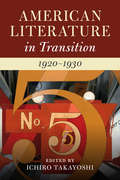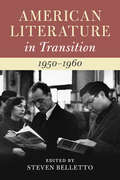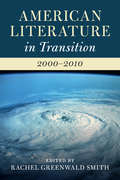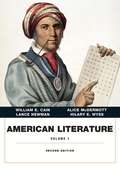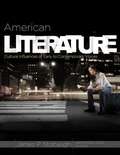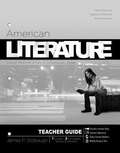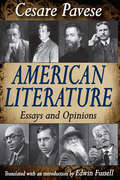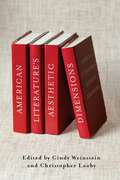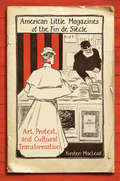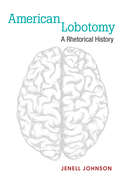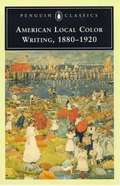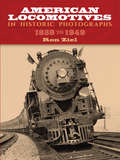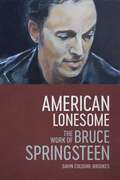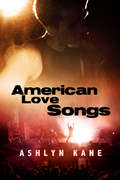- Table View
- List View
American Literature in Transition: American Literature in Transition, 1920–1930
by Ichiro TakayoshiAmerican Literature in Transition, 1920-1930 examines the dynamic interactions between social and literary fields during the so-called Jazz Age. It situates the era's place in the incremental evolution of American literature throughout the twentieth century. Essays from preeminent critics and historians analyze many overlapping aspects of American letters in the 1920s and re-evaluate an astonishingly diverse group of authors. Expansive in scope and daring in its mixture of eclectic methods, this book extends the most exciting advances made in the last several decades in the fields of modernist studies, ethnic literatures, African-American literature, gender studies, transnational studies, and the history of the book. It examines how the world of literature intersected with other arts, such as cinema, jazz, and theater, and explores the print culture in transition, with a focus on new publishing houses, trends in advertising, readership, and obscenity laws.
American Literature in Transition: American Literature in Transition, 1950–1960
by Steven BellettoAmerican Literature in Transition, 1950-1960 explores the under-recognized complexity and variety of 1950s American literature by focalizing discussions through a series of keywords and formats that encourage readers to draw fresh connections among literary form and concepts, institutions, cultures, and social phenomena important to the decade. The first section draws attention to the relationship between literature and cultural phenomena that were new to the 1950s. The second section demonstrates the range of subject positions important in the 1950s, but still not visible in many accounts of the era. The third section explores key literary schools or movements associated with the decade, and explains how and why they developed at this particular cultural moment. The final section focuses on specific forms or genres that grew to special prominence during the 1950s. Taken together, the chapters in the four sections not only encourage us to rethink familiar texts and figures in new lights, but they also propose new archives for future study of the decade.
American Literature in Transition: American Literature in Transition, 2000–2010
by Rachel Greenwald SmithAmerican Literature in Transition, 2000-2010 illuminates the dynamic transformations that occurred in American literary culture during the first decade of the twenty-first century. The volume is the first major critical collection to address the literature of the 2000s, a decade that saw dramatic changes in digital technology, economics, world affairs, and environmental awareness. Beginning with an introduction that takes stock of the period's major historical, cultural, and literary movements, the volume features accessible essays on a wide range of topics, including genre fiction, the treatment of social networking in literature, climate change fiction, the ascendency of Amazon and online booksellers, 9/11 literature, finance and literature, and the rise of prestige television. Mapping the literary culture of a decade of promise and threat, American Literature in Transition, 2000-2010 provides an invaluable resource on twenty-first century American literature for general readers, students, and scholars alike.
American Literature in the Era of Trumpism: Alternative Realities (American Literature Readings in the 21st Century)
by Dolores ResanoThis edited collection offers an exploration of American literature in the age of Trumpism—understood as an ongoing sociopolitical and affective reality—by bringing together analyses of some of the ways in which American writers have responded to the derealization of political culture in the United States and the experience of a ‘new’ American reality after 2016. The volume’s premise is that the disruptions and dislocations that were so exacerbated by the political ascendancy of Trump and his spectacle-laden presidency have unsettled core assumptions about American reality and the possibilities of representation. The blurring of the relationship between fact and fiction, bolstered by the discourses of ‘fake news’ and ‘alternative facts,’ has not only drawn attention to the shattering of any notion of ‘shared’ reality, but has also forced a reexamination of the purpose and value of literature, especially when considering its troubled relation to the representation of ‘America.’ The authors in this collection respond to the invitation to reassess the workings of fiction and critique in an age of Trumpism by considering some of the most recent literary responses to the (new) American realit(ies)—including works by Colson Whitehead, Ben Winters, Claudia Rankine, Gary Shteyngart, Jennifer Egan, and Steve Erickson, to name but a few—, some of which were composed in the run-up to the 2016 election but were able to accurately and incisively imagine the world to come.
American Literature, Grade 11, Volume 1 (HMH Into Literature)
by Kylene Beers Elena Izquierdo Martha HougenNIMAC-sourced textbook
American Literature, Grade 11, Volume 2 (HMH Into Literature)
by Kylene Beers Elena Izquierdo Martha HougenNIMAC-sourced textbook
American Literature, M.A. ENGLISH Final Paper - II, SDE Andhra University
by Prof Ila Rao Dr Rama Murthy Prof D Lakshmana Rao Prof K Viswanadham T. Viswanadha RaoThis is the prescribed book for MA English Final Paper - II - American Literature for students of School of Distance Education, Andhra University
American Literature, Volume I
by Lance Newman Hilary E. Wyss William E. Cain Alice McDermottThe new edition of American Literature presents an exciting opportunity for readers. In keeping with the first edition, this has been created a text that provides a wide variety of selections. Many of the pieces, the readers would expect to see in an American literature text, but included selections that are just as read-worthy, but perhaps not as well known. The readers will recognize most, perhaps all, of the authors of these selections.
American Literature-Student
by James P. StobaughEnjoy beloved classics while developing vocabulary, reading, and critical thinking skills! Each literature book in the series is a one-year course Each chapter has five lessons with daily concept-building exercises, warm-up questions, and guided readings Easy-to-use with suggested reading schedules and daily calendar Equips students to think critically about philosophy and trends in culture, and articulate their views through writing A well-crafted presentation of whole-book or whole-work selections from the major genres of classic literature (prose, poetry, and drama), each course has 34 chapters representing 34 weeks of study, with an overview of narrative background material on the writers, their historical settings, and worldview. The rich curriculum's content is infused with critical thinking skills, and an easy-to-use teacher's guide outlines student objectives with each chapter, providing the answers to the assignments and weekly exercises. The final lesson of the week includes both the exam, covering insights on the week's chapter, as well as essays developed through the course of that week's study, chosen by the educator and student to personalize the coursework for the individual learner.
American Literature-Teacher
by James P. StobaughEnjoy beloved classics while developing vocabulary, reading, and critical thinking skills! Each literature book in the series is a one-year course Each chapter has five lessons with daily concept-building exercises, warm-up questions, and guided readings Easy-to-use with suggested reading schedules and daily calendar Equips students to think critically about philosophy and trends in culture, and articulate their views through writing A well-crafted presentation of whole-book or whole-work selections from the major genres of classic literature (prose, poetry, and drama), each course has 34 chapters representing 34 weeks of study, with an overview of narrative background material on the writers, their historical settings, and worldview. The rich curriculum's content is infused with critical thinking skills, and an easy-to-use teacher's guide outlines student objectives with each chapter, providing the answers to the assignments and weekly exercises. The final lesson of the week includes both the exam, covering insights on the week's chapter, as well as essays developed through the course of that week's study, chosen by the educator and student to personalize the coursework for the individual learner.
American Literature: A History
by Hans Bertens Theo D'haenThis comprehensive history of American Literature traces its development from the earliest colonial writings of the late 1500s through to the present day. This lively, engaging and highly accessible guide: <p><p> offers lucid discussions of all major influences and movements such as Puritanism, Transcendentalism, Realism, Naturalism, Modernism and Postmodernism <p> draws on the historical, cultural, and political contexts of key literary texts and authors <p> covers the whole range of American literature: prose, poetry, theatre and experimental literature <p> includes substantial sections on native and ethnic American literatures <p> explains and contextualises major events, terms and figures in American history. <p> This book is essential reading for anyone seeking to situate their reading of American Literature in the appropriate religious, cultural, and political contexts.
American Literature: A Thematic Approach
by G. Robert Carlsen Edgar H. Schuster Anthony TovattA thematically arranged anthology of poems, short stories, plays, novellas, and excerpts from longer works by American authors.
American Literature: Essays and Opinions
by Cesare Pavese Edwin FussellAn Italian author presents his views of American literature.
American Literature: Essays and Opinions (Princeton Legacy Library #1332)
by Cesare PaveseCesare Pavese (1908-1950) was the leading Italian scholar of American literature of the generation that came to maturity under Mussolini. He was not only an acute and wide-ranging literary critic, but also a sensitive poet and novelist. In addition, he was a prodigious translator. In collaboration with Elio Vittorini, he translated and brought to the attention of the Italian public the works of many important American writers. American literature helped to give direction to Pavese's creative work and was a resource for his personal literary campaign against Fascism.Pavese was a non-academic critic, though far less anti - academic than D. H. Lawrence. His first purpose was to use American literature to subvert Italian literature, but beyond that there were a number of issues on which he disagreed with standard American criticism. When he does, his wild, original energy of discovery can trigger a welcome change of focus for our views of American writing.Pavese never visited or lived in America; it was for him a foreign country, although a shifting and sliding special case. He had no stake in its sectional chauvinisms. He had a vital stake in its whole literature because, as his communications to Vittorini make clear, he had a stake in the literature of the whole world. For a while, America seemed to him the probable center of that whole. This was the center where things were happening in the world of the mind, and where the future was being born and licked into shape. Paveses's writings about American literature still offer original and unsparing insights.
American Literature’s Aesthetic Dimensions
by Cindy Weinstein Christopher. Eds. LoobyRethinking the category of aesthetics in light of recent developments in literary theory and social criticism, the contributors to this volume showcase the interpretive possibilities available to those who bring politics, culture, ideology, and conceptions of identity into their critiques. Essays combine close readings of individual works and authors with more theoretical discussions of aesthetic theory and its relation to American literature. In their introduction, Weinstein and Looby argue that aesthetics never left American literary critique. <P><P> Instead, the essay casts the current "return to aesthetics" as the natural consequence of shortcomings in deconstruction and new historicism, which led to a reconfiguration of aesthetics. Subsequent essays demonstrate the value and versatility of aesthetic considerations in literature, from eighteenth-century poetry to twentieth-century popular music. Organized into four groups—politics, form, gender, and theory—contributors revisit the canonical works of Henry James, Nathaniel Hawthorne, and Stephen Crane, introduce the overlooked texts of Constance Fenimore Woolson and Earl Lind, and unpack the complexities of the music of The Carpenters. Deeply rooted in an American context, these essays explore literature's aesthetic dimensions in connection to American liberty and the formation of political selfhood.Contributors include Edward Cahill, Ivy G. Wilson, June Ellison, Dorri Beam, Christopher Castiglia, Christopher Looby, Wendy Steiner, Cindy Weinstein, Trish Loughran, Jonathan Freedman, Elisa New, Dorothy Hale, Mary Esteve, Eric Lott, Sianne Ngai
American Little Magazines of the Fin de Siecle: Art, Protest, and Cultural Transformation (Studies in Book and Print Culture)
by Kirsten MacLeodIn American Little Magazines of the Fin de Siecle, Kirsten MacLeod examines the rise of a new print media form – the little magazine – and its relationship to the transformation of American cultural life at the turn of the twentieth century. Though the little magazine has long been regarded as the preserve of modernist avant-gardes and elite artistic coteries, for whom it served as a form of resistance to mass media, MacLeod’s detailed study of its origins paints a different picture. Combining cultural, textual, literary, and media studies criticism, MacLeod demonstrates how the little magazine was deeply connected to the artistic, social, political, and cultural interests of a rising professional-managerial class. She offers a richly contextualized analysis of the little magazine’s position in the broader media landscape: namely, its relationship to old and new media, including pre-industrial print forms, newspapers, mass-market magazines, fine press books, and posters. MacLeod’s study challenges conventional understandings of the little magazine as a genre and emphasizes the power of “little” media in a mass-market context.
American Lives and Legends
by John HoldrenThis book contains life stories of Young Benjamin Franklin, Phillis Wheatley, Paul Revere, Sybil Ludington, Sequoyah and stories of Washington Irving: Rip Van Winkle and The Legend of Sleepy Hollow.
American Lobotomy: A Rhetorical History
by Jenell JohnsonAmerican Lobotomy studies a wide variety of representations of lobotomy to offer a rhetorical history of one of the most infamous procedures in the history of medicine. The development of lobotomy in 1935 was heralded as a "miracle cure" that would empty the nation's perennially blighted asylums. However, only twenty years later, lobotomists initially praised for their "therapeutic courage" were condemned for their barbarity, an image that has only soured in subsequent decades. Johnson employs previously abandoned texts like science fiction, horror film, political polemics, and conspiracy theory to show how lobotomy's entanglement with social and political narratives contributed to a powerful image of the operation that persists to this day. The book provocatively challenges the history of medicine, arguing that rhetorical history is crucial to understanding medical history. It offers a case study of how medicine accumulates meaning as it circulates in public culture and argues for the need to understand biomedicine as a culturally situated practice.
American Local Color Writing, 1880-1920
by Elizabeth Ammons Valerie Rohy<p>The era in the United States between the Civil War and the end of World War I, was marked by increased nation-building, immigration, internal migration and racial tension. This period of time saw the rise of local colour literature, which described the peculiarities of regional life through "lived experiences." This anthology brings together works from every part of America, written by men and women of many cultures, ethnicities, ideologies and literary styles. The book features such familiar writers as Joel Chandler Harris, Kate Chopin, Hamlin Garland and Sarah Orne Jewett, and introduces less well-known voices like Sui Sin Far, Abraham Cahan and Zitkala-Sa. The writings illuminate varying concepts of the American identity and racial, class and ethnic stereotypes are both introduced and challenged in many of of the stories. <p>For more than seventy years, Penguin has been the leading publisher of classic literature in the English-speaking world. With more than 1,700 titles, Penguin Classics represents a global bookshelf of the best works throughout history and across genres and disciplines. Readers trust the series to provide authoritative texts enhanced by introductions and notes by distinguished scholars and contemporary authors, as well as up-to-date translations by award-winning translators.</p>
American Locomotives in Historic Photographs: 1858 to 1949
by Ron ZielThis rare collection of 126 "builder portraits" of American locomotives offers an exciting cavalcade of images that chronicle the momentous rise of steam locomotive power in America. Builder portraits are especially prized by railway historians because they are the exacting official photographs of new models taken before repairs, alterations, and weathering altered their original appearance. The builder portraits reprinted here were selected from the William A. Rogers collection, a priceless archive of images documenting the history of American steam locomotion from the pre-Civil War era to the mid-20th century. While the accent in this book is on the oldest and rarest photographs in the Rogers collection, many modern portraits are included as well to demonstrate how highly developed the American steam locomotive had become before the advent of dieselization. Among the engines depicted are the España, a diminutive model built for the Spanish government in 1858; engine no. 216 of the Pennsylvania Railroad, a "fearsome apparition of Gothic character" built in 1861; the Chimbote Emilia, an inspection engine built for railroad company officials in 1868 that is considered a masterpiece of the engine builder's art; and a Union Pacific 1940s' "Big Boy," the largest and heaviest type of steam locomotive ever built.Clearly, builder portraits are the most revealing record possible of the evolution of the American steam locomotive. This rich selection offers railroading historians and enthusiasts a peerless record of a great age in railway history. Railroading expert Ron Zeil's introduction and captions provide readers with a brief railroading background, a commentary on the art of the builder portrait and key details on each locomotive depicted.
American Lonesome: The Work of Bruce Springsteen
by Gavin Cologne-BrookesAmerican Lonesome: The Work of Bruce Springsteen begins with a visit to the Jersey Shore and ends with a meditation on the international legacy of Springsteen’s writing, music, and performances. Gavin Cologne-Brookes’s innovative study of this popular musician and his position in American culture blends scholarship with personal reflection, providing both an academic examination of Springsteen’s work and a moving account of how it offers a way out of emotional solitude and the potential lonesomeness of modern life. <P><P>Cologne-Brookes proposes that the American philosophical tradition of pragmatism, which assesses the value of ideas and arguments based on their practical applications, provides a lens for understanding the diversity of perspectives and emotions encountered in Springsteen’s songs and performances. Drawing on pragmatist philosophy from William James to Richard Rorty, Cologne-Brookes examines Springsteen’s formative environment and outsider psychology, arguing that the artist’s confessed tendency toward a self-reliant isolation creates a tension in his work between lonesomeness and community. He considers Springsteen’s portrayals of solitude in relation to classic and contemporary American writers, from Frederick Douglass, Nathaniel Hawthorne, and Emily Dickinson to Richard Wright, Flannery O’Connor, and Joyce Carol Oates. As part of this critique, he discusses the difference between escapist and pragmatic romanticism, the notion of multiple selves as played out both in Springsteen’s work and in our perception of him, and the impact of performances both recorded and live. By drawing on his own experiences seeing Springsteen perform—including on tours showcasing the album The River in 1981 and 2016—Cologne-Brookes creates a book about the intimate relationship between art and everyday life. <P><P>Blending research, cultural knowledge, and creative thinking, American Lonesome dissolves any imagined barriers between the study of a songwriter, literary criticism, and personal testimony.
American Love Songs
by Ashlyn KaneJake Brenner has too many wild oats to sow to fall in love--or so he claims. Besides, he's much too busy with his band, the Wayward Sons, to go looking for romance. His reticence has nothing to do with his embarrassing crush on Chris, the band's lead singer and Jake's erstwhile best friend. But that was before enigmatic wanderer Parker McAvoy signed on as the band's new lead guitarist. He can only deny his attraction to sweet, dorky Parker for so long before the urge to do something about it becomes impossible to ignore. The trouble is, Parker knows all about Jake's philandering ways--and oh, yeah, he's not gay. Or so Jake thinks until a string of related events provides encouraging new insight. Can he convince Parker to overlook his colorful past and give him a chance? Or will this love song fade out before it even begins?
American Love Story: A Multicultural Romance (Dreamers #3)
by Adriana HerreraNo one should have to choose between love and justice.Haitian-born professor and activist Patrice Denis is not here for anything that will veer him off the path he’s worked so hard for. One particularly dangerous distraction: Easton Archer, the assistant district attorney who last summer gave Patrice some of the most intense nights of his life, and still makes him all but forget they’re from two completely different worlds. All-around golden boy Easton forged his own path to success, choosing public service over the comforts of his family’s wealth. With local law enforcement unfairly targeting young men of color, and his career—and conscience—on the line, now is hardly the time to be thirsting after Patrice again. Even if their nights together have turned into so much more. For the first time, Patrice is tempted to open up and embrace the happiness he’s always denied himself. But as tensions between the community and the sheriff’s office grow by the day, Easton’s personal and professional lives collide. And when the issue at hand hits closer to home than either could imagine, they’ll have to work to forge a path forward…together. One-click with confidence. This title is part of the Carina Press Romance Promise: all the romance you’re looking for with an HEA/HFN. It’s a promise!This book is approximately 95,000 words
American Loyalist Troops 1775-84
by Gerry Embleton Rene ChartrandTo celebrate the 450th title in the Men-at-Arms series, this book examines in depth the units and the uniforms of a still-controversial army: the many thousands of American colonists who chose to fight for King George during the Revolution. In addition to the better-known corps from the Atlantic seaboard, the author also covers the units raised for service against the Spanish in the Floridas, the Caribbean islands and Central America. The text is illustrated with portraits, photographs of rare surviving artifacts, and features color reconstructions by Gerry Embleton, the respected expert on 18th century American forces whose work was recently exhibited in the Smithsonian Institute.
American Lutheranism
by Friedrich Bente"American Lutheranism Vol 1" is a religious text written by Friedrich Bente.
